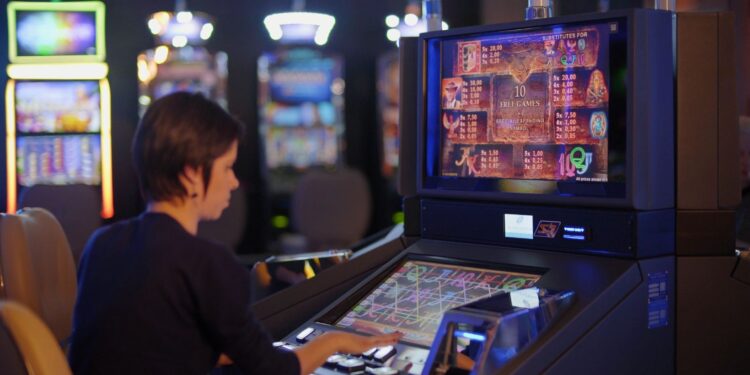Online slots, now a ubiquitous feature of digital casinos worldwide, have a rich and fascinating history that traces back to the late 19th century. From the mechanical slot machines of yesteryears to the cutting-edge digital platforms of today, the evolution of online slots reflects advancements in technology and shifts in societal attitudes towards gambling. This essay delves into the captivating history of slots, exploring their origins, milestones, their profound impact on the gambling industry, and why online slots are the most popular games in today’s online casinos.
Origins of Mechanical Slot Machines
The invention of the Liberty Bell by Charles Fey marked the beginning of the modern slot machine era. With its three spinning reels and simple mechanical operation, the Liberty Bell was a significant departure from earlier gambling devices. Its popularity soared, spreading to bars, saloons, and even barber shops across the United States. Despite early attempts to ban or regulate slot machines, their popularity grew, fueling design and functionality innovations.
Over time, mechanical slot machines evolved to include features such as the ability to hold and nudge reels, increasing the player’s chances of winning. Manufacturers introduced different themes and symbols to attract players, ranging from fruit symbols to popular characters and motifs. These early machines laid the groundwork for the diverse array of slot games we see today, with their basic principles of spinning reels and matching symbols remaining central to the gameplay.
Emergence of Electronic Slot Machines
The transition from mechanical to electronic slot machines in the mid-20th century marked a significant milestone in the evolution of slot gaming. One of the key innovations of Money Honey was its electric hopper, which enabled automatic payouts of up to 500 coins. This eliminated the need for attendants to manually dispense winnings, making the gameplay experience more efficient and seamless for players. The introduction of electronic components also paved the way for larger jackpots, as electronic systems could handle more complex payout structures and calculations.
Electronic slot machines offered several advantages over their mechanical counterparts. They were more reliable and less prone to mechanical failures, reducing downtime and maintenance costs for casino operators. Additionally, electronic slot machines allowed for greater flexibility in game design, enabling developers to experiment with new features and gameplay mechanics.
Electronic technology enabled slot machine manufacturers to innovate rapidly, introducing features such as video displays, multiple paylines, and bonus rounds. Video slots, which replaced traditional mechanical reels with virtual ones displayed on a screen, allowed for greater game design and storytelling creativity. These advancements made slot machines more visually appealing and entertaining, attracting a broader audience of players to casinos worldwide.
By the late 20th century, electronic slot machines had become the dominant form of slot gaming in casinos worldwide, supplanting mechanical machines as the industry standard. Their advanced technology, enhanced gameplay features, and potential for big wins made them immensely popular among players of all ages and backgrounds.

Overall, the emergence of electronic slot machines represented a watershed moment in the history of slot gaming, ushering in a new era of innovation, excitement, and profitability for the gambling industry. These early electronic machines laid the foundation for the digital revolution that would follow, paving the way for the development of online slots and other forms of electronic gaming in the decades to
Transition to Online Slots
The rise of the internet in the 1990s provided a new platform for slot machines to reach a global audience. The emergence of online casinos allowed players to access their favorite slot games from the comfort of their homes, eliminating the need to visit a physical casino. Microgaming’s launch of the first online casino software in 1994 marked a pivotal moment in the history of online gambling, paving the way for the development of online slots.
Online slots offered players unprecedented convenience, accessibility, and variety. Players could choose from games with themes, features, and payout structures. The ability to play anytime, anywhere, coupled with the introduction of progressive jackpots and lucrative bonuses, made online slots immensely popular among casual and seasoned gamblers.
Evolution of Online Slots
Since their inception, online slots have continued to evolve, driven by technological advancements and changing player preferences. Today’s online slots feature state-of-the-art graphics, immersive sound effects, and innovative gameplay mechanics. Developers leverage cutting-edge technologies like HTML5 and WebGL to create visually stunning and highly interactive gaming experiences.
Moreover, the advent of mobile technology has further propelled the evolution of online slots. Mobile slots are designed to be compatible with smartphones and tablets, allowing players to enjoy their favorite games on the go. Responsive design and touchscreen controls enhance the mobile gaming experience, making it seamless and intuitive for players to spin the reels and win big from their mobile devices.
Impact on the Gambling Industry
The proliferation of online slots has had a transformative impact on the gambling industry, reshaping how people gamble and driving unprecedented growth in the sector. Online slots have democratized access to gambling, making it accessible to a wider audience than ever before. Players no longer need to travel to a physical casino to enjoy their favorite slot games; they can log in to an online casino from their computer or mobile device.
Moreover, online slots have become a major revenue driver for online and offline casinos. The convenience and accessibility of online slots have attracted a new generation of players, expanding the market and fueling innovation in game development and technology.

Introducing features such as live dealer slots and virtual reality (VR) slots promises to enhance the online gaming experience further, ensuring that online slots remain a dominant force in the gambling industry for years to come.
Conclusion
The history of online slots is a testament to this iconic casino game’s enduring popularity and evolution. From the mechanical slot machines of the late 19th century to the cutting-edge digital platforms of today, online slots have undergone remarkable transformation, driven by advancements in technology and changing player preferences. As we look to the future, online slots are poised to continue their ascent, offering players worldwide an immersive and thrilling gaming experience unlike any other.








